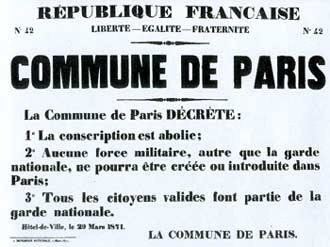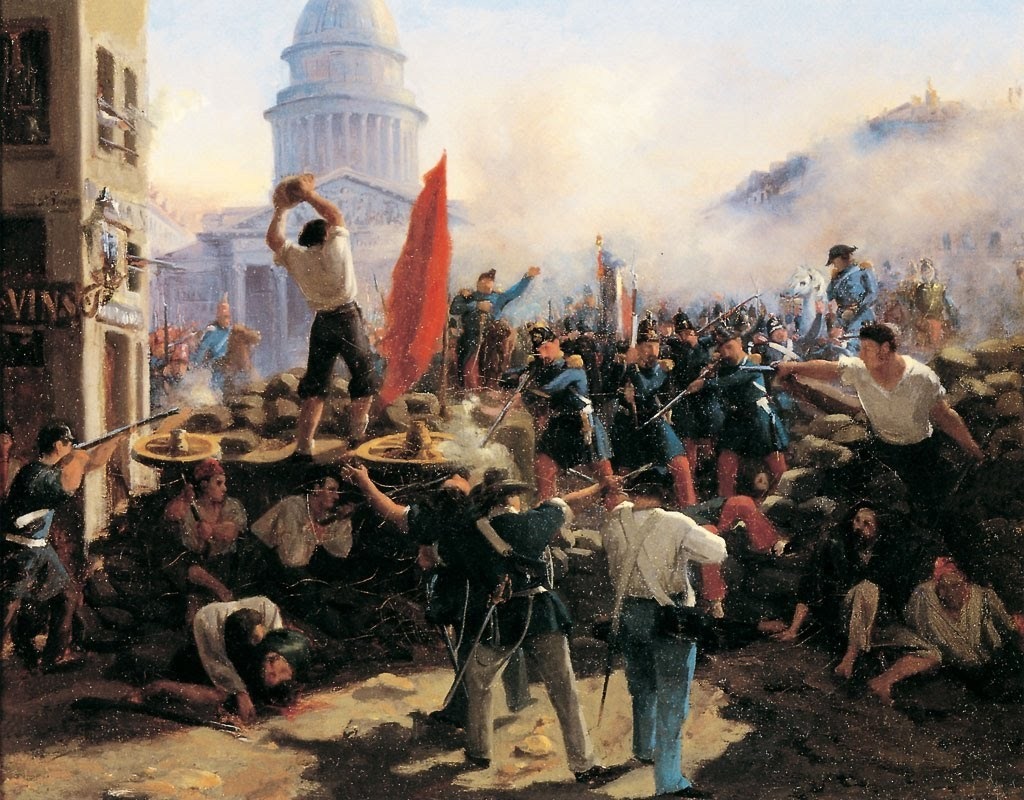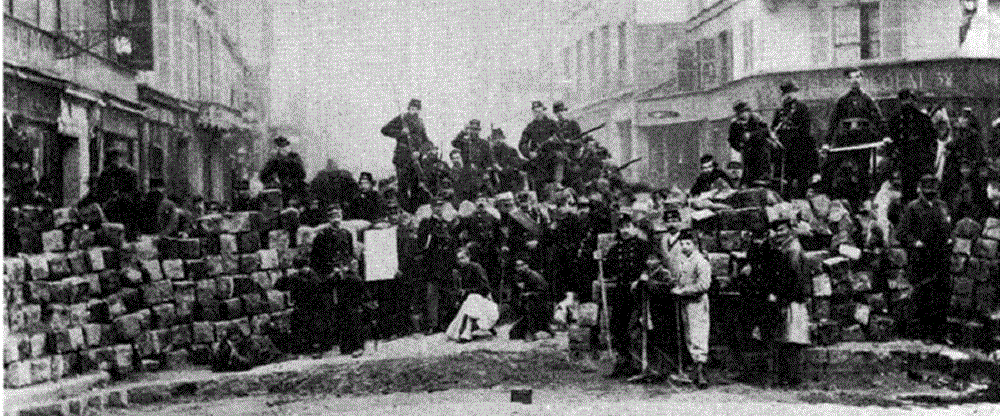Por Emilio Poliak
“…Yo seré despiadado; la expiación será completa y la justicia inflexible… El suelo está cubierto de sus cadáveres; ese espectáculo horroroso servirá de lección”. Con estas palabras, Louis Adolphe Thiers – jefe del poder ejecutivo de la Tercera República Francesa – anunciaba la derrota de la Comuna. Cerca de 30.000 parisienses asesinados; unos 45.000 detenidos – muchos de ellos ejecutados posteriormente – y miles desterrados o condenados a trabajos forzados. De esta manera la burguesía francesa castigaba la osadía de un pueblo que mostró por primera vez que la clase obrera podía tomar el poder en sus manos y parir un nuevo orden social.
La guerra franco-prusiana y la revolución
En 1870, bajo la dirección del canciller Otto Von Bismarck, Prusia avanzaba hacia la unificación alemana amenazando la hegemonía francesa en Europa. El 15 de julio el imperio de Luis Bonaparte (Napoleón III) le declaró la guerra, pero la aventura duró poco. El 2 de septiembre Napoleón III es derrotado y cae prisionero junto a más de 100 mil soldados.
El 4 de septiembre multitudinarias movilizaciones en París derriban el imperio y fuerzan la proclamación de la República. Se crea un gobierno de Defensa Nacional que en realidad obstaculiza y abandona toda defensa de París. La capital es sitiada por las tropas prusianas durante cuatro meses.
El gobierno sólo buscaba negociaciones de paz. El 28 de enero de 1871 se decide la rendición de la ciudad. Bismarck acuerda una tregua para que se convoque a elecciones a una Asamblea Nacional que ratifique las condiciones impuestas por Prusia: desarme del ejército de París, pago de una indemnización millonaria y la cesión a Alemania de las ciudades de Alsacia y Lorena. En las elecciones triunfan los sectores más reaccionarios y Thiers es nombrado como jefe del poder ejecutivo de la III República Francesa. El nuevo gobierno se instaló en la ciudad de Versalles, a pocos kilómetros de la capital. Su principal objetivo consistió en desarmar al pueblo parisiense.
La insurrección
La resistencia parisina estaba comandada por la Guardia Nacional, un cuerpo diferente al ejército regular que se componía de la población en armas y cuyos oficiales eran elegidos por los batallones. El 16 de marzo Thiers llega a París con el objetivo de desarmar al pueblo. En la madrugada del 18, el ejército trató de apoderarse de los cañones de la Guardia Nacional. La clase obrera se lanzó a las calles con las mujeres a la cabeza. En pocas horas los trabajadores ganaron para su causa a muchos soldados y expulsaron al resto. A la noche, el Comité Central de la Guardia Nacional, formado por delegados de los batallones, era la única autoridad de París ante la huida del gobierno y de la burguesía.
La primera medida del Comité Central fue convocar a elecciones para elegir representantes en todos los distritos de París. El resultado de esas elecciones es el surgimiento de la Comuna, cuyos miembros eran casi todos trabajadores o representantes reconocidos por ellos. Así nacía el primer gobierno obrero de la historia.
La Comuna en el poder
La Comuna reunía funciones legislativas y ejecutivas. Todos los cargos administrativos, judiciales y educacionales eran electivos, revocables y percibían el mismo salario que los demás trabajadores.
En los dos meses que duró, pese a la crisis económica por un lado y a la guerra contra Versalles por el otro, la Comuna llevó adelante medidas de ruptura con el régimen burgués dirigidas a la realización de un nuevo orden social al servicio de la clase obrera y los sectores oprimidos del pueblo.

Abolió el ejército permanente suplantándolo por el pueblo armado, declarando a la Guardia Nacional como única fuerza armada. Condonó los pagos de los alquileres de las viviendas y las deudas de comerciantes y artesanos. Decretó la separación de la Iglesia del Estado, suprimió los sueldos que se le pagaban al clero y declaró propiedad nacional todos los bienes de la Iglesia. Declaró la laicidad de la enseñanza. Suprimió el trabajo nocturno y entregó a las organizaciones obreras todos los talleres y fábricas que habían abandonado los patrones. Y resolvió que los funcionarios y comuneros no podían ganar más de 6000 francos: el salario obrero promedio.
Dirá Marx que “fue ésta la primera revolución en que la clase obrera fue abiertamente reconocida como la única clase capaz de iniciativa social incluso por la gran masa de la clase media parisina — tenderos, artesanos, comerciantes –, con la sola excepción de los capitalistas ricos.”
La derrota
No sólo la burguesía francesa, sino toda la europea se aterrorizaron ante ese nuevo Estado Obrero y democrático reclamando su liquidación. A principios de abril comienza la ofensiva de Versalles para aplastar la Comuna. Thiers pacta con Bismarck para disponer de 170 mil soldados, la mayoría prisioneros dejados en libertad por Alemania, un “hecho sin precedente de que en la guerra más tremenda de los tiempos modernos el ejército vencedor y el vencido confraternicen en la matanza común del proletariado (…). La dominación de clase ya no se puede disfrazar bajo el uniforme nacional; todos los gobiernos nacionales son uno solo contra el proletariado“(Marx) El 20 de mayo logran ingresar a París y comienza “la semana sangrienta”. El 28 de mayo la Comuna es derrotada. Las matanzas en masa y ejecuciones sumarias siguieron hasta mediados de junio.

La ausencia de un plan pre concebido, la inexperiencia y la política de las distintas corrientes ideológicas dentro de la Comuna, con predominio anarquista, son factores que explican en parte las vacilaciones que facilitaron la victoria de la reacción. Engels señalaría años más tarde que “así se explica que la Comuna dejase de hacer, en el terreno económico, muchas cosas que, desde nuestro punto de vista actual, debió realizar. Lo más difícil de comprender es indudablemente el santo temor con que aquellos hombres se detuvieron respetuosamente en los umbrales del Banco de Francia. Fue éste además un error político muy grave. El Banco de Francia en manos de la Comuna hubiera valido más que diez mil rehenes. Hubiera significado la presión de toda la burguesía francesa sobre el Gobierno de Versalles para que negociase la paz con la Comuna.” Otra debilidad fue no avanzar sobre Versalles para derrotar al gobierno central en su momento de mayor debilidad -a comienzos de marzo- antes de que Thiers y Bismarck pactasen el refuerzo del ejército. Probablemente la suerte de otros levantamientos (Lyon, Marsella, Toulouse, etc) que se sucedieron hubiera sido distinta y la Comuna no habría quedado aislada.
Lecciones del primer gobierno obrero
Los dos meses que duró la Comuna fueron de una rica experiencia para la clase obrera mundial. A pesar de la derrota ayudó a sacar importantes enseñanzas, enriquecer la teoría marxista sobre el Estado y preparar a la clase obrera y a los revolucionarios para las luchas que vendrían. Marx escribe como una conclusión central que “la clase obrera no puede limitarse simplemente a tomar posesión de la máquina del Estado tal como está, y a servirse de ella para sus propios fines” y afirma que la Comuna “era la forma política al fin descubierta que permitía realizar la emancipación económica del trabajo.”
Esa nueva forma descubierta al fin consistía en el reemplazo del ejército profesional por “el pueblo en armas”. La sustitución de las instituciones de la democracia burguesa por una democracia directa donde todos los delegados son revocables, sin privilegios y con un salario similar al de un obrero. La generalización de los soviets rusos y su desarrollo como organismos del poder obrero y popular 46 años después tiene sus raíces en la experiencia de los comuneros.
A 150 años de una de las gestas más heroicas de la historia del movimiento obrero las palabras de Lenin mantienen plena vigencia: “La causa de la Comuna es la causa de la revolución social, es la causa de la completa emancipación política y económica de los trabajadores, es la causa del proletariado mundial. Y en este sentido es inmortal.”
Fuentes bibliográficas
K. Marx: “La guerra civil en Francia”, 1871
F. Engels: “Introducción a La guerra civil en Francia”, 1891
V.I. Lenin: “En memoria de la Comuna”, 1911
S. Balmartino: “La Comuna de París”. En Historia del Movimiento Obrero, Centro Editor de América Latina




